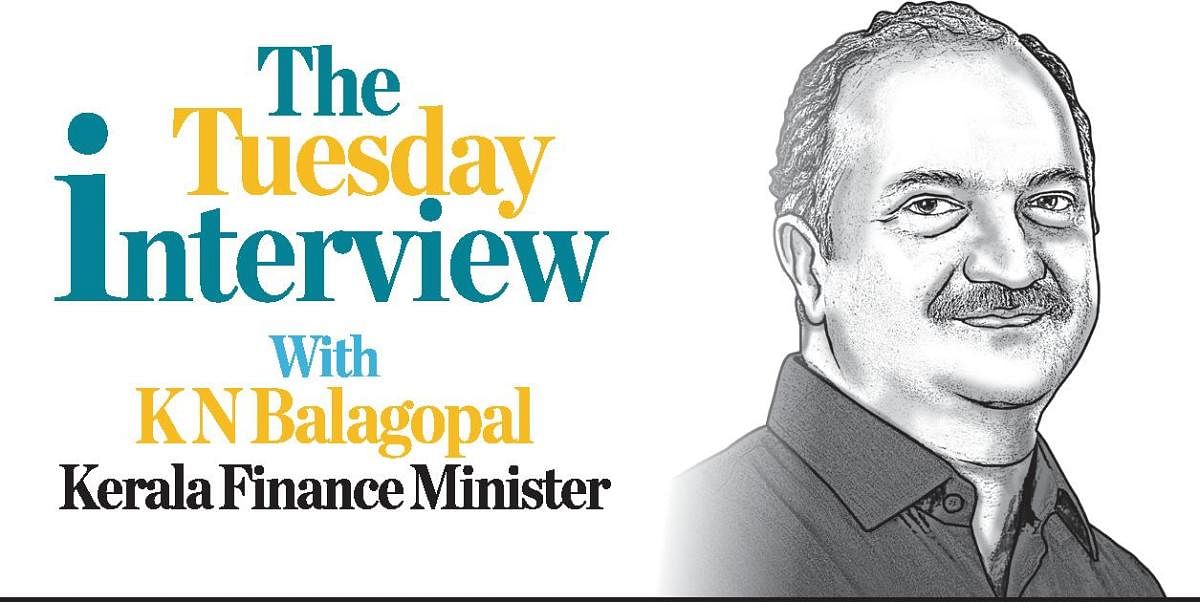
At a time when the economy was said to be on a recovery path, the new coronavirus variant ‘Omicron’ has brought uncertainty, raising worries over the impact it will have on the Indian economy and the states. Kerala Finance Minister K N Balagopal spoke to DH’s Shemin Joy on this and other issues, including the contentious issue of GST compensation and the National Monetisation Pipeline.
The Omicron variant has appeared on the scene just as the economy was recovering. What impact will it have?
We have only seen a small (economic) recovery, and that is also mainly due to delayed purchases and other factors. Now, Omicron has hit. We don’t know what impact it will have. If we have to impose measures like lockdown again, it will be disastrous and worse than the previous lockdown. Several decisions that impact the lives of the common man have been taken by the Centre during the pandemic. Such policies will surely have a negative impact. They are on a selling spree in the public sector. This is leading to loss of jobs.
What should be the policy direction?
The world might face more pandemics in the future. The government will have to ensure that there is adequate health infrastructure. At present, there is an effort to provide Covid-19 vaccines to all. The coverage of the first dose is nearing completion but issues related to the availability of vaccines for the second dose remain. Patent issues have created trouble for developing countries. There is a view that if vaccination was more intensive in Africa, Omicron might not have happened. If the US or Europe had helped Africa, this panic would not have been there. This is because of the fallout of global pharma companies owning patents on medicines. I am not an authority (on the subject), but I feel if vaccine production was in the control of governments, then vaccine prices would have been lower. Then, I think, we could have done vaccination at a higher pace. India should look at producing low-cost medicines, not just for India but for the world.
What should one keep in mind while framing economic policies now?
We have to keep in mind that the pandemic and its after-effects are going to stay with us for some time. The attitude that I have money, so I will get vaccinated and I don't care whether the economically deprived are jabbed or not, is not going to help. We should keep this in mind while designing the vaccine programme. We should recall that when India moved into the product patent regime from the process patent regime, the cost of medicines increased. Countries across the globe should deliberate on these issues.
As a Rajya Sabha MP earlier, you were part of the GST Select Committee. On GST, the compensation for states is set to end next July. What is your view?
We have demanded that it should be extended for another five years. These are difficult times. Even the Finance Ministers from BJP-ruled states like Uttar Pradesh are talking about their concerns. Shouldn't the states be given more share? At this stage, if GST compensation is stopped, it will create problems not just for Kerala but for other states, too. Before the GST regime, Kerala's annual growth rate was 14 per cent. Now, we are not reaching there, and that is why there is a need for compensation.
One view at the time of implementation of GST was that it would be beneficial for Kerala. Is that still true, post-pandemic and with the return of Malayalis from the Gulf in numbers?
GST is not being implemented in the way it was first envisaged. On several issues, the Centre is acting against the interests of the states. Tax rates were cut arbitrarily. For example, the GST rate on refrigerators was 28 per cent, it was cut to 18 per cent. So, for a refrigerator costing Rs 10,000, the tax burden should come down from Rs 2,800 to Rs 1,800 and its shop price should reduce by Rs 1,000. But that has not happened. I am saying this after a study in Kerala. Reducing taxes has only resulted in an enhanced profit for companies. There was a view initially that GST would be beneficial to Kerala but actually, we have suffered loss. The Centre is reducing several direct taxes. There was a reduction of Rs 1 lakh crore in income tax from corporates. This will impact the Centre's finances. When the Centre's revenue slides, states are also impacted as their share also reduces. When they reduce direct taxes, on the other hand, they increase indirect taxes. GST is eroding states' financial freedom and the country’s financial federal character. This is a dangerous situation.
The excise duty on petroleum products and its reduction by the Centre has triggered a demand for states to reduce their taxes, too. How do you see this argument?
States have a share in excise duty but not in special excise duty. What the Centre has done is, it has increased special excise duty. When the Centre is imposing a huge tax, what can the states do? This is intruding into the powers of the states.
What is your view on the Centre’s plan to bring a bill in Parliament to privatise two public sector banks?
This is what they do in all sectors. What is new in what they are doing? Why did we go ahead with the nationalisation of banks earlier? One should understand that there should be transparency in the functioning of financial institutions. Remember the 2008 economic crisis? The US and Europe suffered but India managed to survive because of our nationalised banks. We shouldn't be oblivious to the dangers of banks being privatised. We have the examples of Yes Bank, IDBI and ICICI Bank where its top officials face allegations. This is a disaster waiting to happen.
Check out the latest videos from DH:
